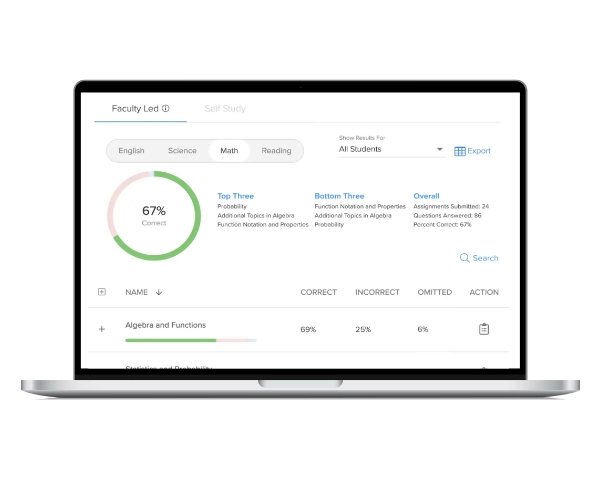When Marie Curie was awarded the Nobel Prize in Chemistry in 1911, it was because of her dedicated work in chemistry and groundbreaking contributions to the field of radioactivity. Curie’s success as a chemist was a direct result of the years of planning and preparation that had brought her to that point.
Just as Marie Curie did for her groundbreaking discoveries in radioactivity, teachers must make serious plans for test preparation in the weeks before a summative exam. Every course topic must be spiraled through during these weeks of content review, along with regular practice questions, in order to fully prepare students for test day.
Because they are aware that the AP Chemistry exams are difficult, chemistry teachers are meticulous in their preparation plans. Just 54% of students who took the AP Chemistry exam passed with a score of 3 or higher, according to the College Board®‘s score distribution report1 for the 2022 AP exams.
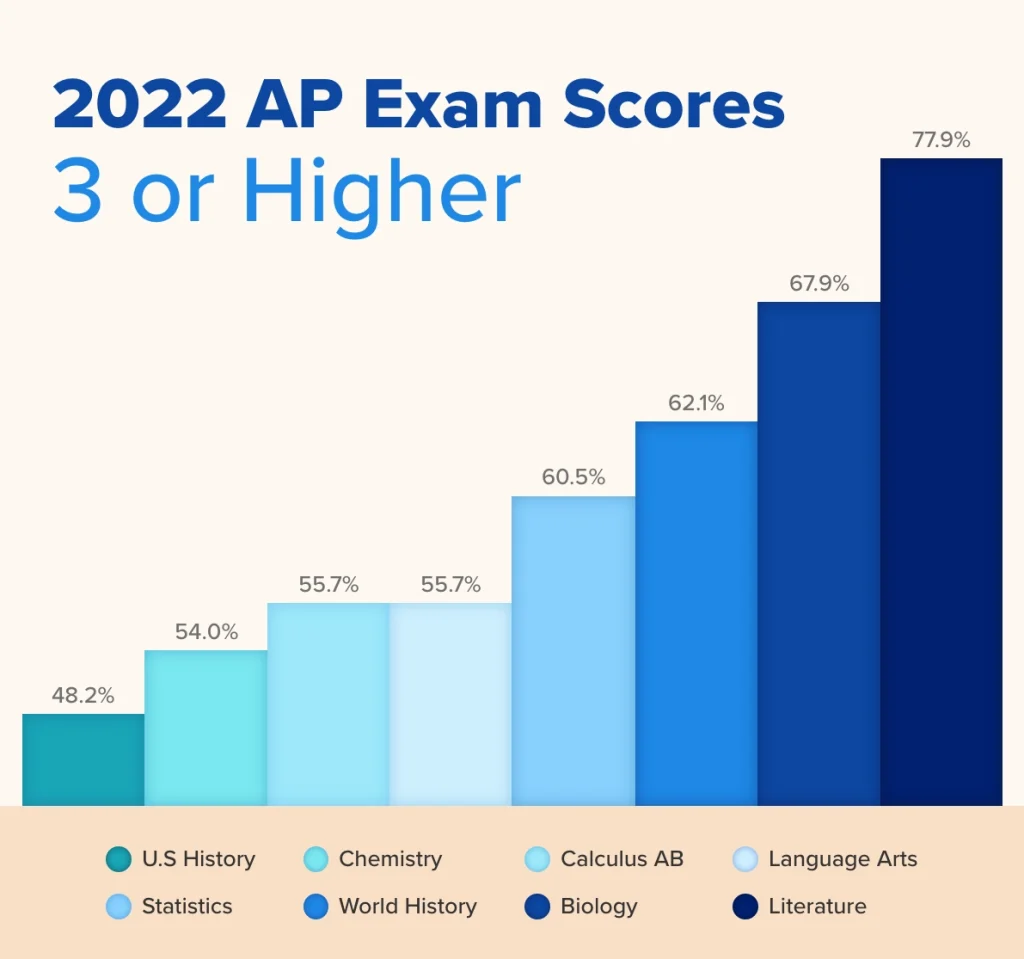
Student Score Distributions on AP exams (2022)
In order to give their students the best chance of passing the exam, AP Chemistry teachers must carefully prepare for an extremely rigorous summative review. We’ve provided five AP Chemistry exam tips that can be incorporated into any content review to help make that a little simpler.
Tip 1: Break Curriculum into Smaller, Doable Parts
To ensure that students remember the material on test day, teachers should spiral through the key ideas in each of the course units in the weeks leading up to the AP Chemistry exam. The issue with covering an entire course-worth of material in just a few weeks prior to the exam is that there isn’t much time to review such a large amount of material. However, studies conducted over the past few years demonstrate that breaking up study material into more manageable “bite-sized” chunks is a more efficient way to prepare for a summative exam. This tactic is known as “chunking.”
A study2 published in the Educational Psychology Review looked at how breaking up information into manageable chunks could help students learn better. According to the study, students felt more confident about the subjects they were learning as a result of chunking. AP Chemistry Teachers can work on smaller portions of the unit or concept, one at a time, until students have learned all the essential material required for the test, rather than covering an entire unit or a huge foundational concept in a single class.
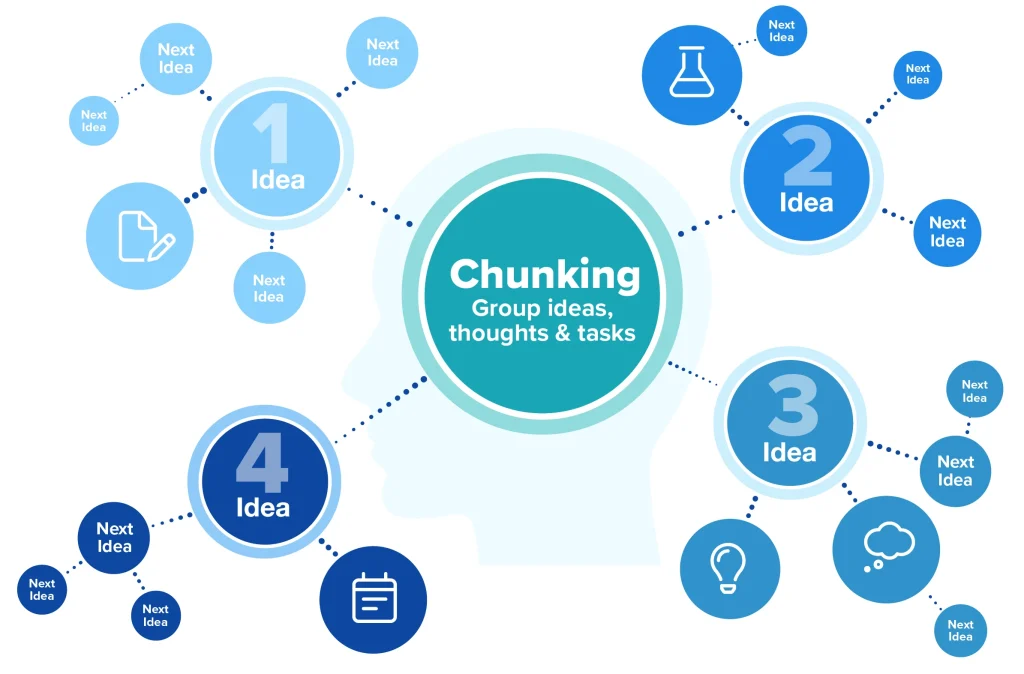
Another strategy AP Chemistry teachers can use to get their students ready for the test is “interleaving,” or reviewing several related topics at once. According to research, when teachers vary their subject matter, their students learn to distinguish between seemingly unrelated subjects and are better able to use their knowledge.2 The use of chunking and interleaving by AP Chemistry instructors will inevitably result in students feeling prepared and confident on test day.
Our choice for an AP Chemistry test review guide: UWorld
Our pick for an AP Chemistry test review guide teachers can use as a resource for their summative course review is UWorld’s AP Chemistry Study Guide: Tips, Strategies, and Common Mistakes to Avoid.
Why We Chose It:
- Provides comprehensive coverage of all the nine units covered in the AP Chemistry exam
- Written by experts in the field of AP Chemistry who have extensive experience in teaching and preparing students for the exam
- Offers valuable strategies and AP Chemistry exam tips to help teachers and students prepare effectively for the test. It covers topics such as test-taking strategies, time management, and how to approach different types of questions
- Identifies common mistakes that students make when taking the AP Chemistry exam and provides guidance on how to avoid them
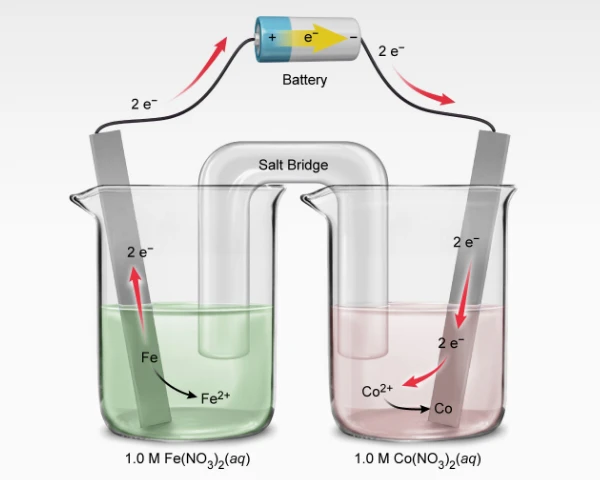
Tip 2: Practice with Released Exams
One of the simplest ways AP Chemistry instructors can help their students prepare for the exam is by having them practice with previously released exams. According to a study from the University of Nebraska-Lincoln3, test preparation questions that were comparable to those on the real exam raised marks by an average of 15%. Comparatively, test scores rose only 6% when test prep questions were different from those on the real exam. And of course, no questions are as comparable to the ones on the test as questions that came from prior AP Chemistry exams.
Our Choice for Released Exam Questions: The College Board Secure Released Exams
The College Board is our top choice for a released exam resource. After all, it is the only place where you can download actual, released AP exams. Although students do not have access to these free, full-length assessments, AP teachers can use them in class. These recently released exams are also accessible in AP Classroom, both in the AP Question Bank and with other recently released questions. 4 Of course, teachers should be mindful of yearly changes to the AP curriculum when using the released exams. AP Chemistry teachers can discover more information about these exams in the AP Classroom User Guides.
Why We Chose It:
- Actual exam questions from past years, which makes them an authentic and reliable resource
- Align with the current format and structure of the AP Chemistry exam, including the number of questions, types of questions, and time limit
- Past exam questions cover a variety of question types and topics
- Designed to cover a range of difficulty levels, from easy to challenging
Tip 3: Multiple-Choice Practice Makes Perfect
Practice with multiple-choice questions is, of course, an important part of getting ready for the AP Chemistry test. While spiraling through AP Chemistry test review topics, teachers should try to get their students to finish at least two multiple-choice questions they’ve already covered in the past. Students can review important concepts that might be covered on the test with the aid of multiple-choice exit tickets or bellringers.
In order to prepare for the AP Chemistry exam, students can practice using test-taking strategies by responding to multiple-choice questions. Students can develop the habit of using annotations, paying attention to context clues, and eliminating answers that are obviously incorrect by working through a variety of multiple-choice problems. Their test-taking efficiency and accuracy will both benefit from this habit. Students who practice multiple-choice questions may also improve their time management skills and become more accustomed to the test’s pace.
Our Choice for Multiple-Choice Practice: UWorld
As the best resource for multiple-choice practice tests, we chose UWorld’s Learning Tools for AP Courses. It’s a great way to incorporate multiple-choice questions into last-minute study strategies for the AP Chemistry exam.
Students who use UWorld’s multiple-choice questions get excellent explanatory feedback. Personalized practice is provided by adaptive learning technology, which modifies each lesson according to the level of understanding achieved by the student. Students can use it all year to review what they’ve learned, assess their strengths and areas for improvement, and develop their knowledge and skills in preparation for the AP Chem exam. In the last few weeks of AP Chemistry exam preparation, it also gives students a quick way to review concepts and practice multiple-choice questions.
Why We Chose It:
- Provide instant feedback to students, including explanations for correct and incorrect answers. These comprehensive explanations enable students to learn from their mistakes and improve their understanding of key Chemistry concepts
- Offers comprehensive coverage of all the topics covered in the AP Chemistry exam, with hundreds of multiple-choice practice questions
- Practice questions are timed, which helps students prepare for the time constraints of the AP Chemistry exam and helps teachers assess their students’ ability to complete the exam within the given time frame
- Provide the option to customize practice sessions, allowing teachers to select specific topics and question types for their students to practice. This allows teachers to target their AP Chemistry test review to the areas where their students need the most help and ensure that they are well-prepared for the exam
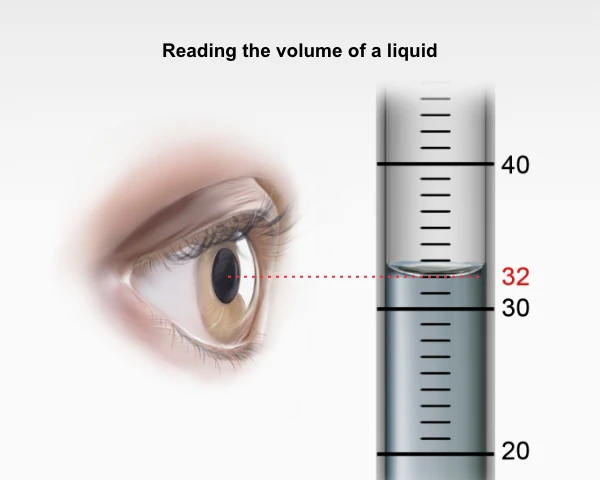
Tip 4: Greater Understanding with Justifications – Studying for FRQs
One of the biggest distinctions between education today and education a few decades ago is understanding the value of understanding. Teachers must make sure that students understand why something is, rather than just giving them the answer, in order for them to truly learn it. Therefore, it’s important to give students plenty of chances to explain their answer choices when preparing for the AP Chemistry test. Students can understand and remember the material by practicing free-response questions and having them explain their reasoning in writing, in addition to getting accustomed to FRQs for the test. According to a study that was published in the Journal of Computer-Assisted Learning5, students who had to justify their answers to questions had a better understanding of the material than those who were only required to provide answers. A student may comprehend the subject matter better and retain it if written explanations are added to the learning process.
Teachers can help their students improve their understanding of spiraled topics by having them complete FRQs and explain their answers during the limited time they have to study for the AP Chemistry exam. Teachers can also help their students succeed on the AP Chemistry exam by giving them online examples of outstanding free-response essays written by other students. In addition, they can work together using model questions to come up with ideas for FRQs.
Our choice for additional FRQ practice: AP study
The AP Chemistry Free-Response Practice Tests from AP Study are a great resource for additional FRQ practice questions. In addition to the released questions by the College Board, it is a fantastic FRQ resource.
Why We Chose It:
- Follow the same format and structure as the AP Chemistry exam, which makes them an excellent resource for teachers looking for authentic FRQs
- Cover a range of question types, including short answer questions, long answer questions, and essay questions
- Provides the option to customize tests, allowing teachers to select specific topics and question types for their students to practice
- Provides comprehensive coverage of all the key topics covered in the AP Chemistry exam
Tip 5: Repetition with Flashcards
When reviewing previous course material and reviewing crucial vocabulary, repetition is a fantastic way to make sure that the material is retained. With the help of flashcards, students can actively learn while honing their retrieval skills, which enhances their long-term memory. According to the Central Penn College Learning Center, “Flashcards help students to engage in active recall or a process wherein students actively engage in learning by stimulating our memories and creating lasting connections to the material.”6
When preparing their students for the AP Chemistry exam, teachers must go over a broad range of scientific ideas and crucial vocabulary words. Participating in flashcard-based activities during the review of these ideas in class will keep students interested and motivated. Whether students study flashcards on their own or use them in group review activities, consistent flashcard-based review activities in AP Chemistry classes can help students retain and recall important course material.
Our recommendation for AP Chemistry flashcards: UWorld
The UWorld flashcards feature is our top recommendation for an AP Chemistry flashcard resource. Students can review and improve their AP Chemistry knowledge using the flexible and practical UWorld flashcards feature. They can design their own decks and narrow in on particular subjects. It is a useful study tool for any student who wants to ace the AP Chemistry exam because of the flashcard feature’s adaptability and user-friendly interface.
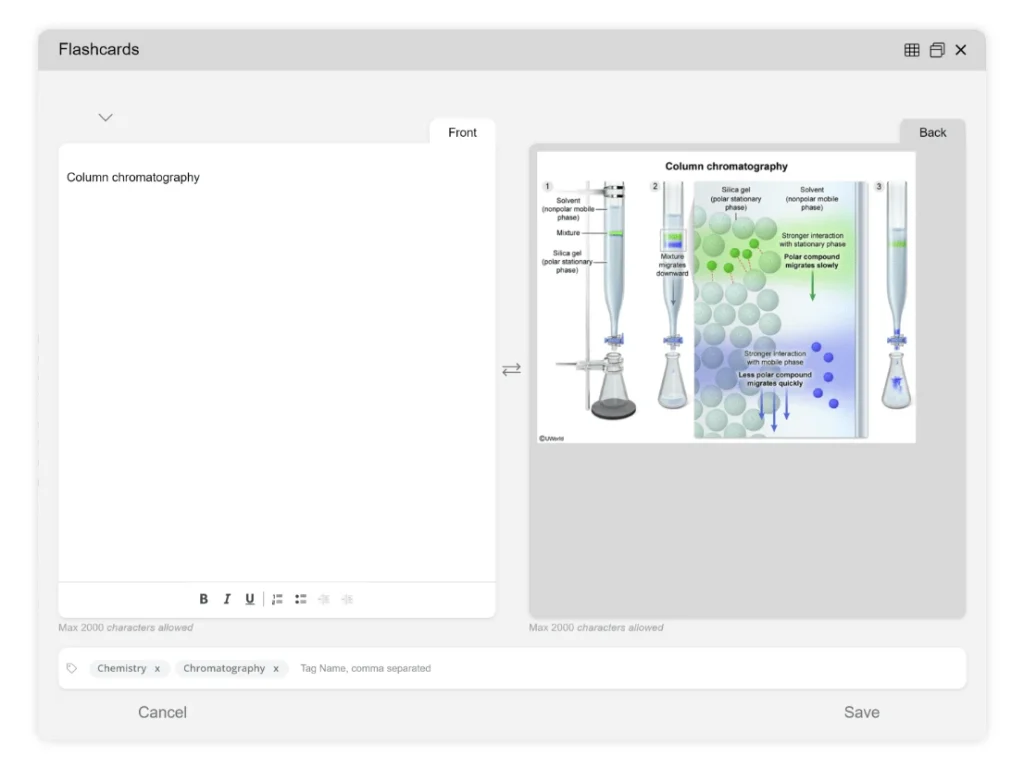
Additionally, teachers can assign a variety of review tasks that require their students to use paper flashcards. Here are some suggestions for how to use them to prepare for the AP Chemistry exam.
Prioritize Comprehension Over Memorization:
Try to relate information to other ideas rather than just memorizing it to deepen your understanding of the subject.
Construct Your Own Flashcards:
Making your own flashcards will improve your memory because it will make you interact with the material and put it in your own words.
Write Text and Draw Images on Your Cards:
Your brain can establish connections between the linguistic and visual representations of the information by using both text and images on your flashcards, which can improve retention and recall.
Make Review Fun with Flashcards:
By incorporating games or other enjoyable activities into flashcard review, you can increase learning retention and foster a more positive attitude toward the learning process.
Try to relate information to other ideas rather than just memorizing it to deepen your understanding of the subject.
Making your own flashcards will improve your memory because it will make you interact with the material and put it in your own words.
Your brain can establish connections between the linguistic and visual representations of the information by using both text and images on your flashcards, which can improve retention and recall.
By incorporating games or other enjoyable activities into flashcard review, you can increase learning retention and foster a more positive attitude toward the learning process.
Bonus Tip: Prepare Students with Test Day Reminders
This last piece of advice might seem more like general test-taking guidance than a review for the AP Chemistry exam, but it’s crucial to remember to go over what students need to do and bring on the exam day. It happens every year: students forget to bring a pencil, a fully charged calculator, turn off their phones, or show up late for their AP exams. However, a study by The College Board7 found that, on average, students who arrived on time and had all the supplies they required for an AP exam performed 20 points better than those who were running late or had forgotten their supplies. Discuss a list of all the preparations your students need to make before the AP Chemistry test, as well as the supplies they need to bring on test day with them.
Checklist of Reminders for AP Chemistry Students
The Day Before the AP Chemistry Exam:
Set out everything you’ll need for the test
Avoid studying excessively for the test
Eat a balanced meal and drink plenty of water
Take time to unwind and do stress-relieving things
Review test-taking strategies
Check the exam’s start time and location twice
To ensure you wake up on time, set multiple alarms
Include a valid photo ID and all other necessary items in your bag
Plan your travel to the exam site
The Day of the AP Chemistry Exam:
Bring a pen with black or dark blue ink
Bring a valid photo ID issued by the government
Bring your AP student pack, which includes a demographic sheet and an AP number label
Bring your exam e-ticket or confirmation of exam registration
Bring a watch to keep track of the time
Bring a snack and water, which must be left on the floor throughout the test and only touched during breaks
Key Takeaways
There is no doubt that the last few weeks leading up to the AP Chemistry exam are crucial for teachers who want to give their students the best content review and test preparation possible. Teachers can help their students feel more prepared and confident when taking tests by using the five AP Chemistry exam tips in this article.
Learn more about how we support AP educators who strive to make a difference in the lives of their students with our Learning Tools for AP Courses.
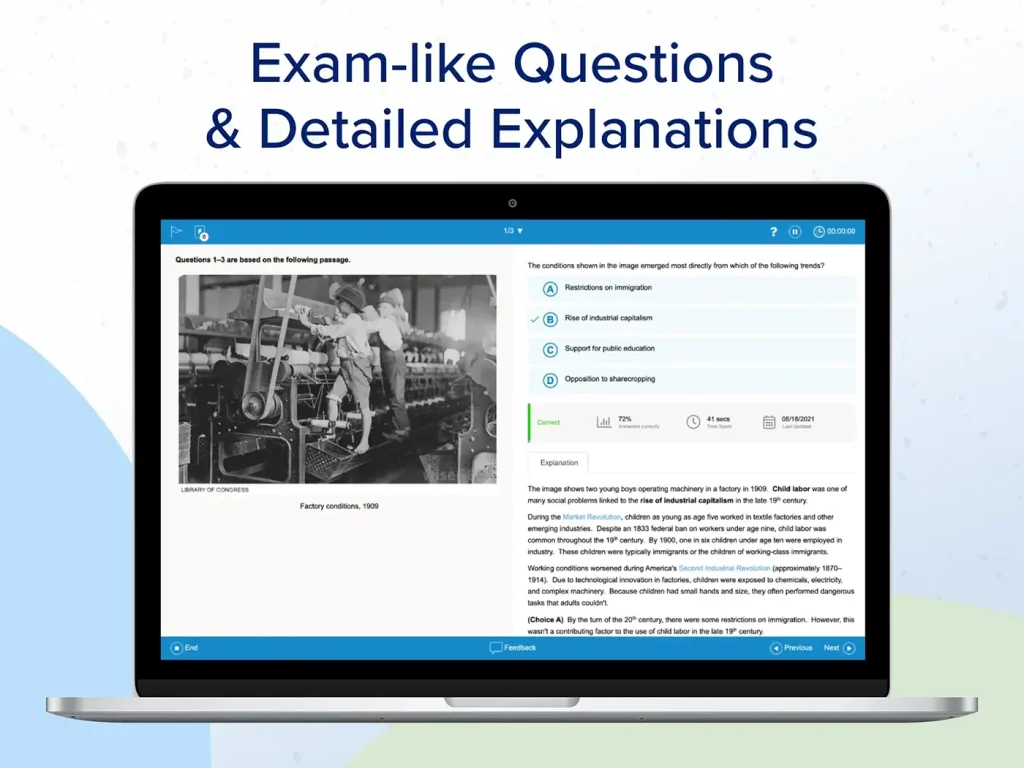
References
- Student Score Distributions* AP exams – May 2022. (n.d.). Retrieved March 22, 2023, from https://apcentral.collegeboard.org/media/pdf/ap-score-distributions-by-subject-2022.pdf
- Rohrer, D. (2012, July 28). Interleaving helps students distinguish among similar concepts – educational psychology review. SpringerLink. Retrieved March 21, 2023, from https://link.springer.com/article/10.1007/s10648-012-9201-3
- The effects of age and professional expertise on … – Wiley Online Library. (n.d.). Retrieved March 22, 2023, from https://onlinelibrary.wiley.com/doi/abs/10.1002/acp.1467
- Formative assessment. AP For All. (n.d.). Retrieved March 29, 2023, from https://apforallnyc.com/formative-assessment/
- Let me explain! the effects of writing and … – Wiley Online Library. (n.d.). Retrieved March 22, 2023, from https://onlinelibrary.wiley.com/doi/10.1111/jcal.12608
- Libguides: Learning Center – Study Skills: Flashcards. Flashcards – Learning Center – Study Skills – LibGuides at Central Penn College. (n.d.). Retrieved March 22, 2023, from https://guides.centralpenn.edu/c.php?g=695569&p=4999857
- Source: College Board. (2021). AP Exam Score Distributions. Retrieved from https://reports.collegeboard.org/media/pdf/2021-ap-student-score-distributions_1.pdf

